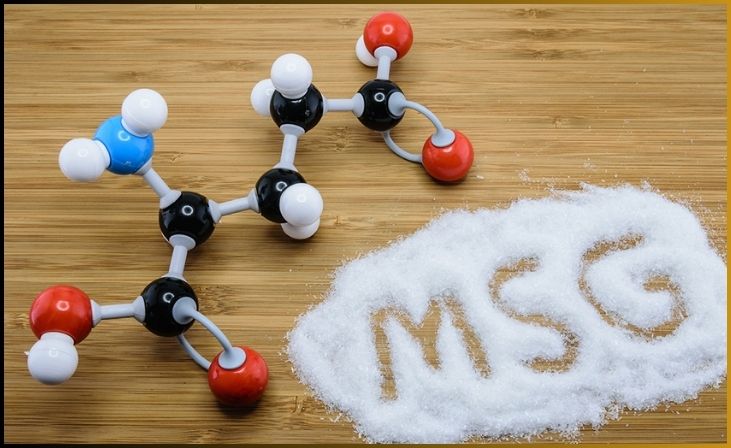Monosodium glutamate (MSG), a flavor enhancer with a long and controversial history, has been the subject of numerous myths and misconceptions. Many have wondered whether consuming MSG regularly poses health risks. In this comprehensive exploration, we delve into the science and facts surrounding MSG to provide clarity and dispel the common misconceptions.
We’ll examine its safety, the potential link to “Chinese Restaurant Syndrome,” and the individual sensitivity that some may experience. From FDA and WHO approvals to the importance of moderation, this blog offers a well-rounded perspective on MSG and its place in our diets. Whether you’re a curious consumer, a home cook, or someone seeking to make informed dietary choices, this blog will equip you with the knowledge needed to navigate the world of MSG with confidence and assurance.
Table of Contents
ToggleMSG: What Is It?
MSG is the sodium salt of glutamic acid, an amino acid naturally found in various foods, including meat, fish, vegetables, and dairy products. It was first isolated from a type of seaweed by a Japanese chemist named Kikunae Ikeda in 1908. He discovered that glutamic acid was responsible for the savory, rich flavor known as umami. To stabilize glutamic acid, it’s processed into MSG, a white, odorless crystalline powder.
MSG is widely used as a food additive to enhance the natural flavors of various dishes. When added to food, it accentuates the umami taste, making savory dishes more delicious. While the term “umami” may not be as familiar as “sweet,” “sour,” “bitter,” or “salty,” it’s a fundamental element of taste that adds depth and complexity to the culinary world.
For More- The World’s Six Hottest Peppers
The MSG Controversy: Common Misconceptions
Despite its widespread use in the food industry, MSG has been the subject of controversy and misinformation. Let’s address some of the common misconceptions surrounding MSG:
1. MSG Is Harmful to Health

One of the most persistent myths surrounding MSG is the belief that it is harmful to health, causing a range of adverse effects. However, scientific research has repeatedly failed to provide conclusive evidence to support this claim. MSG, when consumed in reasonable amounts, is generally recognized as safe by authoritative bodies like the FDA and WHO. Studies examining its effects have not found a consistent link between MSG and serious health problems.
While it is true that a small percentage of individuals may experience mild, short-lived symptoms after consuming large amounts of MSG, these reactions are typically benign and temporary. The safety of MSG, when used in moderation, has been supported by a wealth of scientific research, dispelling the notion that it poses significant harm to health.
2. MSG Is an Allergen
Another common misconception about MSG is that it is an allergen. However, this notion is not accurate. True allergies involve an immune response to a specific allergen, triggering symptoms that can range from mild to severe, such as hives, difficulty breathing, or anaphylaxis. In contrast, reactions to MSG do not typically involve the immune system. Instead, they are often mild and resemble symptoms like headaches, sweating, or nausea in a small percentage of individuals.
These symptoms are more appropriately categorized as MSG sensitivity rather than an allergic reaction. It’s essential to distinguish between allergies and sensitivities, as the two have different underlying mechanisms and implications for health. While allergies should be taken seriously, MSG sensitivity is generally benign and temporary.
3. MSG Causes “Chinese Restaurant Syndrome”
A widely held belief, often referred to as “Chinese Restaurant Syndrome,” claims that eating Chinese food, particularly dishes containing MSG, leads to a variety of symptoms, including headaches, dizziness, and general discomfort. However, scientific research has challenged this idea. The symptoms attributed to “Chinese Restaurant Syndrome” are more likely due to other factors, such as the high sodium content in certain dishes, overall meal composition, or individual sensitivities to various ingredients.
Furthermore, the perception that MSG is unique to Chinese cuisine is a misconception. MSG is used in various global cuisines, and it is found naturally in many foods. While some individuals may experience mild, temporary symptoms after consuming large amounts of MSG, these reactions are generally not serious and do not indicate a broader health concern. The link between MSG and “Chinese Restaurant Syndrome” is largely a myth that does not align with scientific findings.
The Safety of MSG: What Does the Science Say?

Scientific studies have scrutinized MSG’s safety profile for many years. Here’s what research reveals about its consumption:
1. FDA and WHO Approvals
Monosodium glutamate (MSG) has undergone rigorous scrutiny by international health and food safety authorities. Both the United States Food and Drug Administration (FDA) and the World Health Organization (WHO) have classified MSG as “generally recognized as safe” (GRAS) when used according to good manufacturing practices.
These designations come after extensive evaluation of scientific evidence and comprehensive safety assessments. The FDA and WHO approvals provide a strong endorsement of MSG’s safety when used responsibly in food products. This recognition offers consumers reassurance that MSG, a flavor enhancer used in a wide range of foods, does not pose significant health risks.
While individual sensitivities may lead to mild, temporary symptoms in a small percentage of people, the vast majority can consume MSG without experiencing any adverse effects. These approvals reflect a consensus among experts that MSG is a safe food ingredient when used as intended.
2. No Consistent Evidence of Harm
Scientific research into the safety of monosodium glutamate (MSG) has consistently failed to provide conclusive evidence of harm associated with its consumption. Multiple comprehensive reviews and studies have been conducted, examining the potential adverse effects of MSG, including the commonly cited “Chinese Restaurant Syndrome.” However, these investigations have not yielded consistent results linking MSG to significant health issues.
Don't just scroll, subscribe!
BuzzTrail's unique web-stories are the cure for boredom you've been waiting for.
While a small percentage of individuals might experience mild, temporary symptoms after consuming large amounts of MSG, such reactions are often benign and self-limiting. Such symptoms can include headaches, sweating, or nausea. Importantly, these reactions are distinct from allergic responses and are more appropriately categorized as MSG sensitivity.
3. Some Individuals May Experience Mild Reactions
While monosodium glutamate (MSG) is generally recognized as safe, it’s important to acknowledge that a small percentage of individuals may experience mild, temporary reactions after consuming relatively large amounts of MSG. These reactions can manifest as symptoms such as headaches, sweating, or nausea. This phenomenon is often referred to as MSG sensitivity.
It’s crucial to differentiate between MSG sensitivity and allergies. Allergic reactions involve the immune system and can result in more severe symptoms. In contrast, MSG sensitivity typically leads to mild and short-lived discomfort that resolves on its own.
4. MSG Sensitivity
MSG sensitivity is a relatively rare occurrence in which some individuals may experience mild and temporary symptoms after consuming monosodium glutamate (MSG). These symptoms can include headaches, sweating, or nausea, and they typically occur shortly after consuming relatively large amounts of MSG.
It’s important to emphasize that MSG sensitivity differs from an allergy. Allergic reactions involve the immune system and can lead to severe and potentially life-threatening symptoms. In contrast, MSG sensitivity is generally characterized by mild and self-limiting discomfort that resolves without the need for medical intervention.
Should You Avoid MSG on a Regular Basis?
The question of whether you should avoid consuming MSG on a regular basis depends on various factors, including your individual tolerance, dietary preferences, and health considerations. Here are some key points to consider:
1. Individual Sensitivity
Individual sensitivity to monosodium glutamate (MSG) varies widely among people. While MSG is recognized as generally safe for consumption, a small percentage of individuals may experience mild and temporary symptoms after consuming relatively large amounts of it. These symptoms can include headaches, sweating, or nausea, among others.
The reasons for this variability in MSG sensitivity are not entirely clear, but it may be influenced by factors such as genetics, underlying health conditions, or individual tolerance thresholds. It’s crucial to distinguish between MSG sensitivity and allergies, as the two have different mechanisms and implications for health.
2. Balanced Diet
The role of monosodium glutamate (MSG) in one’s diet should be considered within the broader context of overall dietary choices. Consuming MSG as part of a balanced diet that includes a variety of foods is generally regarded as safe.
A balanced diet typically includes an array of fruits, vegetables, lean proteins, whole grains, and other nutrient-rich foods. While MSG can enhance the umami flavor of certain dishes, it should not replace the foundational components of a healthy diet. Instead, it can complement the flavors of meals and make them more enjoyable.
3. Moderation
When it comes to monosodium glutamate (MSG) consumption, the principle of moderation is of paramount importance. While MSG is generally recognized as safe for most individuals, it is advisable to use it in moderation and make informed dietary choices.
Excessive consumption of MSG, like any food additive or ingredient, is not recommended. Highly processed foods that contain significant amounts of MSG may also be high in sodium and other additives, which can contribute to health concerns such as hypertension and cardiovascular issues.
4. Culinary Applications
Monosodium glutamate (MSG) has found its place in the world of culinary arts as a flavor enhancer, particularly in dishes that benefit from a savory umami taste. Its applications span across various cuisines and cooking styles, where it plays a unique role in intensifying and deepening the flavors of foods.
In home cooking, MSG can be used to elevate the taste of homemade dishes. It can be added to soups, stews, sauces, and marinades to enhance their savory profile, often described as umami. MSG can also be employed in seasoning meat, vegetables, or snacks, making them more flavorful and enjoyable. When used judiciously and in combination with other high-quality ingredients, MSG can contribute to a richer, more satisfying culinary experience.
Practical Tips for Informed Choices
Whether you decide to include MSG in your diet or avoid it, here are some practical tips for making informed choices:
- Read Labels: When shopping for processed foods, check ingredient labels for MSG or its alternatives like hydrolyzed proteins or autolyzed yeast extract.
- Cook at Home: Preparing meals from scratch gives you more control over the ingredients, allowing you to choose the quality and quantity of MSG in your dishes.
- Be Mindful of Dietary Preferences: If you have dietary preferences, such as vegetarian or vegan, be aware that some plant-based products may contain MSG or glutamic acid derived from plant sources.
- Listen to Your Body: Pay attention to how your body reacts to MSG. If you experience adverse symptoms, consider minimizing your intake.
- Consult a Healthcare Professional: If you’re unsure about your sensitivity to MSG or have concerns about its consumption, consult a healthcare professional for guidance.
Also Read- 10 Effective Tips to Get Your Child Hooked on Probiotic-Rich Foods
The Bottom Line
The decision of whether to avoid consuming MSG on a regular basis ultimately rests on your individual preferences and tolerance. While MSG has been the subject of unfounded myths and fears, scientific evidence suggests that it can be safely consumed as part of a balanced diet. As with any food additive or ingredient, moderation and informed choices are essential for a healthy and enjoyable culinary experience. By understanding the facts about MSG and considering your own needs, you can make dietary decisions that best suit your well-being and culinary preferences.
FAQs
Is MSG safe to consume?
Is MSG safe to consume?
MSG has been extensively studied and is generally recognized as safe when used in accordance with good manufacturing practices. Scientific research has not provided consistent evidence linking MSG to harmful health effects.
What are the common misconceptions about MSG?
What are the common misconceptions about MSG?
Common misconceptions include the belief that MSG is harmful, an allergen, and responsible for “Chinese Restaurant Syndrome.” These notions have been debunked by scientific research.
Can some individuals be sensitive to MSG?
Can some individuals be sensitive to MSG?
Some individuals may experience mild, temporary symptoms like headaches, sweating, or nausea after consuming large amounts of MSG. This condition is often referred to as MSG sensitivity, which is distinct from an allergy.

